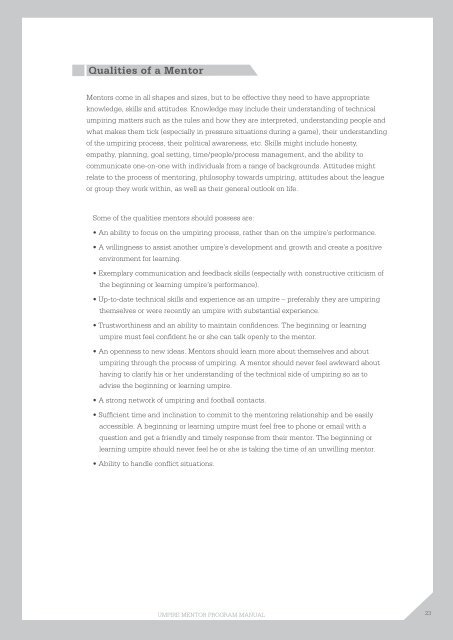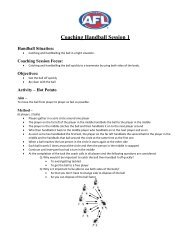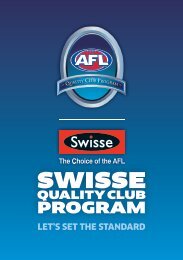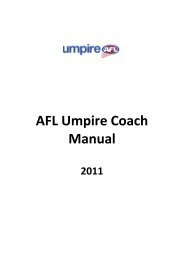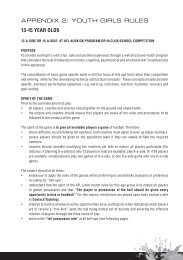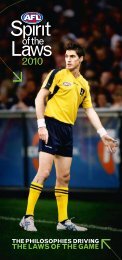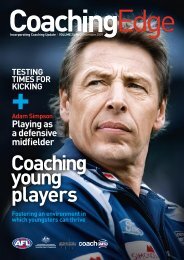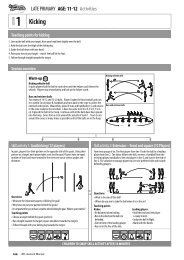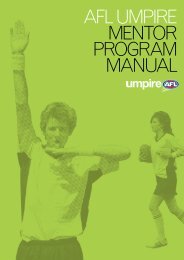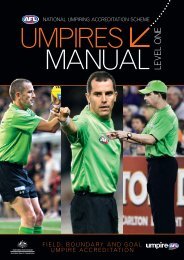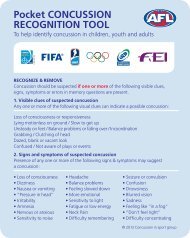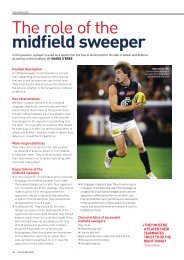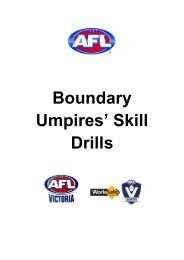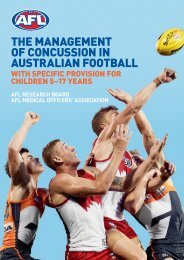AFL UMPIRE MENTOR PROGRAM MANUAL - AFL Community
AFL UMPIRE MENTOR PROGRAM MANUAL - AFL Community
AFL UMPIRE MENTOR PROGRAM MANUAL - AFL Community
You also want an ePaper? Increase the reach of your titles
YUMPU automatically turns print PDFs into web optimized ePapers that Google loves.
Qualities of a Mentor<br />
Mentors come in all shapes and sizes, but to be effective they need to have appropriate<br />
knowledge, skills and attitudes. Knowledge may include their understanding of technical<br />
umpiring matters such as the rules and how they are interpreted, understanding people and<br />
what makes them tick (especially in pressure situations during a game), their understanding<br />
of the umpiring process, their political awareness, etc. Skills might include honesty,<br />
empathy, planning, goal setting, time/people/process management, and the ability to<br />
communicate one-on-one with individuals from a range of backgrounds. Attitudes might<br />
relate to the process of mentoring, philosophy towards umpiring, attitudes about the league<br />
or group they work within, as well as their general outlook on life.<br />
Some of the qualities mentors should possess are:<br />
• An ability to focus on the umpiring process, rather than on the umpire’s performance.<br />
• A willingness to assist another umpire’s development and growth and create a positive<br />
environment for learning.<br />
• Exemplary communication and feedback skills (especially with constructive criticism of<br />
the beginning or learning umpire’s performance).<br />
• Up-to-date technical skills and experience as an umpire – preferably they are umpiring<br />
themselves or were recently an umpire with substantial experience.<br />
• Trustworthiness and an ability to maintain confi dences. The beginning or learning<br />
umpire must feel confi dent he or she can talk openly to the mentor.<br />
• An openness to new ideas. Mentors should learn more about themselves and about<br />
umpiring through the process of umpiring. A mentor should never feel awkward about<br />
having to clarify his or her understanding of the technical side of umpiring so as to<br />
advise the beginning or learning umpire.<br />
• A strong network of umpiring and football contacts.<br />
• Suffi cient time and inclination to commit to the mentoring relationship and be easily<br />
accessible. A beginning or learning umpire must feel free to phone or email with a<br />
question and get a friendly and timely response from their mentor. The beginning or<br />
learning umpire should never feel he or she is taking the time of an unwilling mentor.<br />
• Ability to handle confl ict situations.<br />
<strong>UMPIRE</strong> <strong>MENTOR</strong> <strong>PROGRAM</strong> <strong>MANUAL</strong> 23


